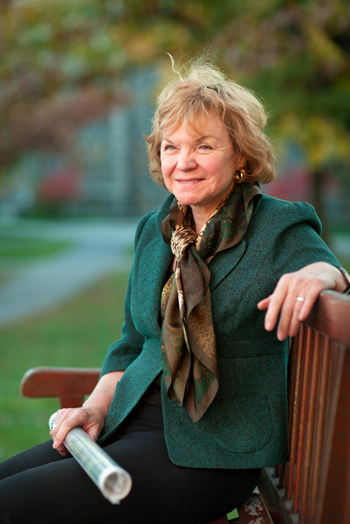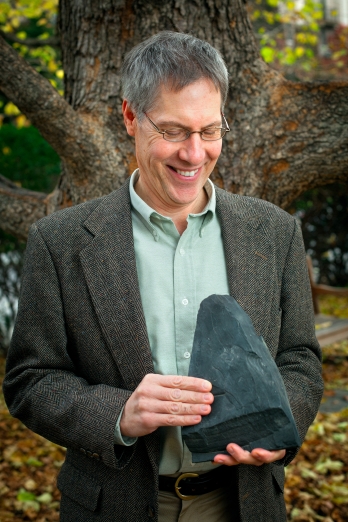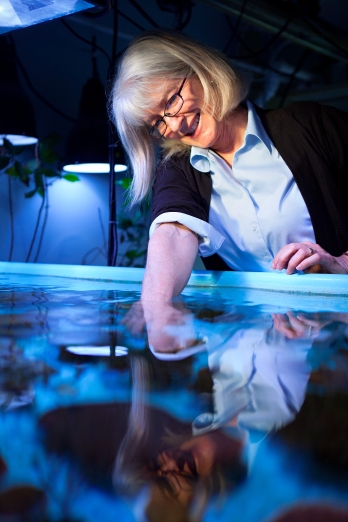COVER STORY
Q&A: Reports from the front line of ideas for a sustainable planet
How does Cornell rate at fostering interdisciplinary collaborations?
When I arrived at Cornell, my goal was to develop a research and outreach program focused on the economics of food supply chains, emphasizing linkages to other disciplines such as nutrition, environmental sciences and engineering. We first organized a lunch at the Atkinson Center around the sustainability of food systems, then we generated an Atkinson grant proposal involving faculty from three colleges and nine departments. The first year of the grant, we met regularly to develop a common language and to identify key links among the primary multidimensional sustainability aspects associated to food systems. We also used the grant to build external partnerships with public and private organizations. As a result, today we have not one but two large multistate, multidisciplinary grants funded by the federal government.
– Miguel Gomez, associate professor, applied economicsand management

Susan Christopherson, an economic geographer, has conducted comprehensive impact studies of natural gas drilling.
I'm fortunate to be trained in geography, a field traditionally concerned with human-environment relations. Cornell's focus on sustainability has created many more opportunities for faculty and students interested in connecting across disciplinary boundaries to learn from one another. The scientists, social scientists and engineers who work together are unusually curious, life-long learners, and able to listen. This year we extended our interdisciplinary project to a course on energy transitions that has attracted students from engineering, natural resources, communication, as well as city and regional planning. One thing that seems to unite the faculty at Cornell working across fields is their commitment to Cornell's land-grant mission. Because we are focused outward – on the bigger goal of serving the community – we find ways to work together.
– Susan Christopherson, professor, city and regional planning

Rod Howe leads Cornell efforts to improve New York state's environmental health, education and access to sustainability science. See larger image
What impact is Cornell sustainability research having close to home, in upstate New York?
At Cornell Cooperative Extension, our educational approach to energy solutions takes into account the protection of environmental health, creating and maintaining vital communities, and promoting economic opportunities. For instance, we have responded to a wide variety of stakeholders who seek a scientific, economic, social and environmental understanding of the issues associated with Marcellus Shale natural gas exploration and drilling. This has been a tremendous example of a land-grant university at work. I now hear citizens and policymakers using such concepts as energy transitions, which is based on the need to move toward renewable energy sources and using a "systems approach," which looks at all levels of impacts, including social, economic and environmental, thanks in part to CCE's effort to raise what we call "energy literacy." We want to empower people with knowledge to make their own choices about energy development.
– Rod Howe, assistant director of Cornell Cooperative Extension
What will our grandchildren's lives look like?

Drew Harvell, coral reef expert. See larger image
As a scientist who studies oceans, you might expect me to say that we will leave a world to our grandchildren with terribly reduced ecosystem services, no coral reefs, coastal areas inundated from sea level rise, and a massive exodus of coastal people as climate refugees. And that is certainly a possibility. However, despite the dire outlook today, I have hope that our society will undergo a global tipping point that will alter our future behavior and result in a world for our grandchildren with sustainable oceans. Call me overly optimistic since I don't know where the solutions will come from, but I think there should be hope. First, young people are starting to stand up for their rights to inherit a sustainable world. Second, we are assembling a global effort to manage our oceans better than we ever have. And third, we are putting in place renewable energy research and plans for sustainable living that will change our lives.
– Drew Harvell, professor, ecology and evolutionary biology, and associate director for environment, Atkinson Center
Ask a historian about the future, and you're bound to get an evasion. The great lesson of historical study is that nothing is inevitable, that every event or development could have gone in a thousand different directions. Change is not only constant but also contingent, uncertain, utterly unpredictable, influenced by innumerable causal forces, by the smallest decisions of ordinary people. But I happen to be an environmental historian, so I do try to stay aware, as it were, of which way the wind is blowing. I imagine, in a few decades, that the world is going to be hotter and stormier and that we might even have to abandon some places, maybe like Miami and New Orleans. One thing I know from history is that values tend to change slowly. But there are examples of ideological revolutions: very few Englishmen living in 1770 would have predicted that their grandchildren would abolish slavery throughout the Empire. Maybe our grandchildren will abolish pollution.
– Aaron Sachs, associate professor, history
<<View entire story as one page>>